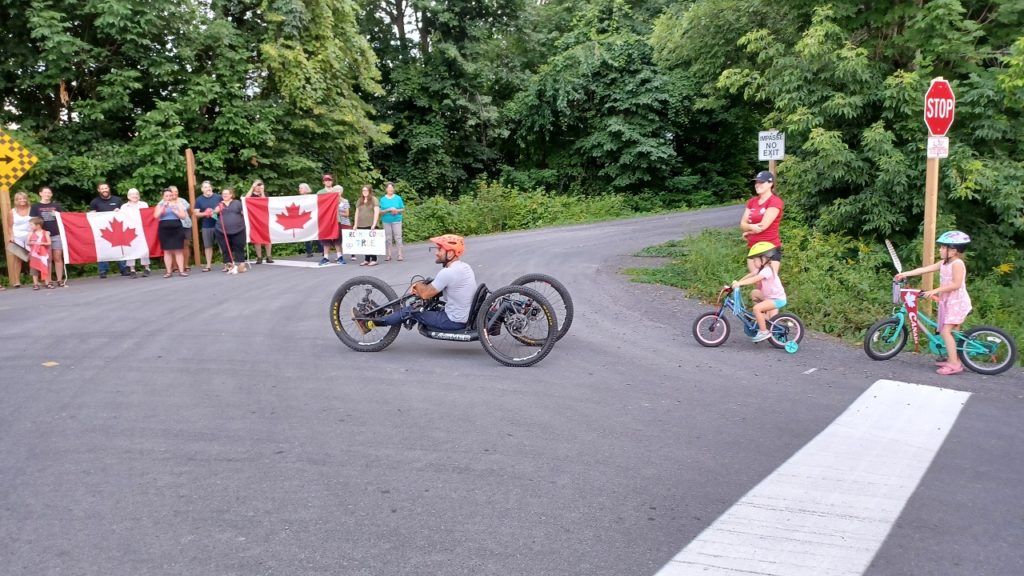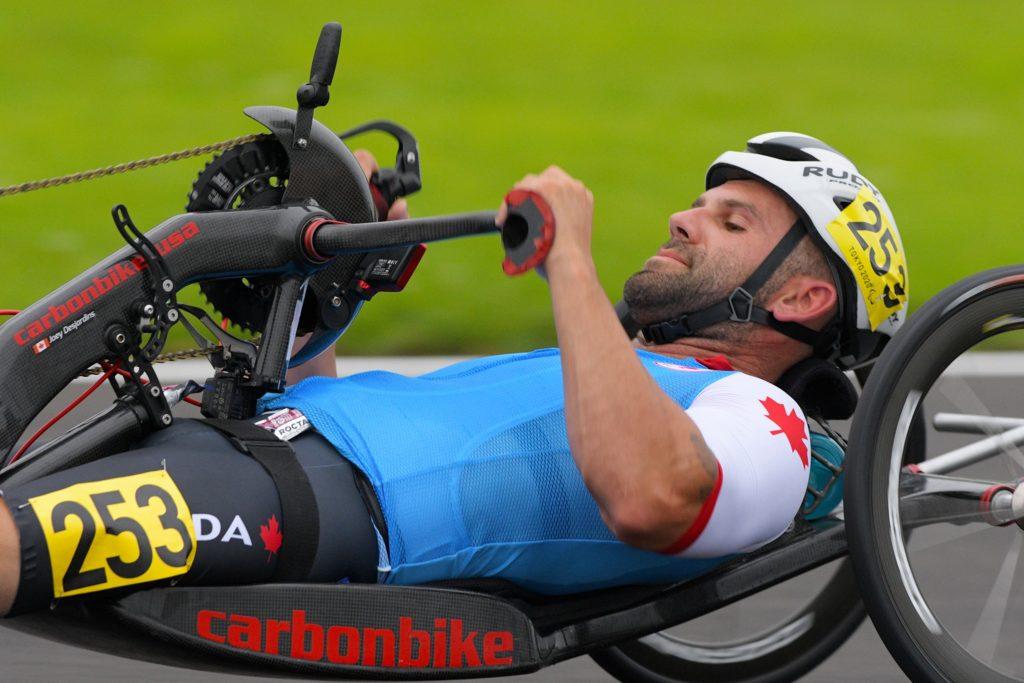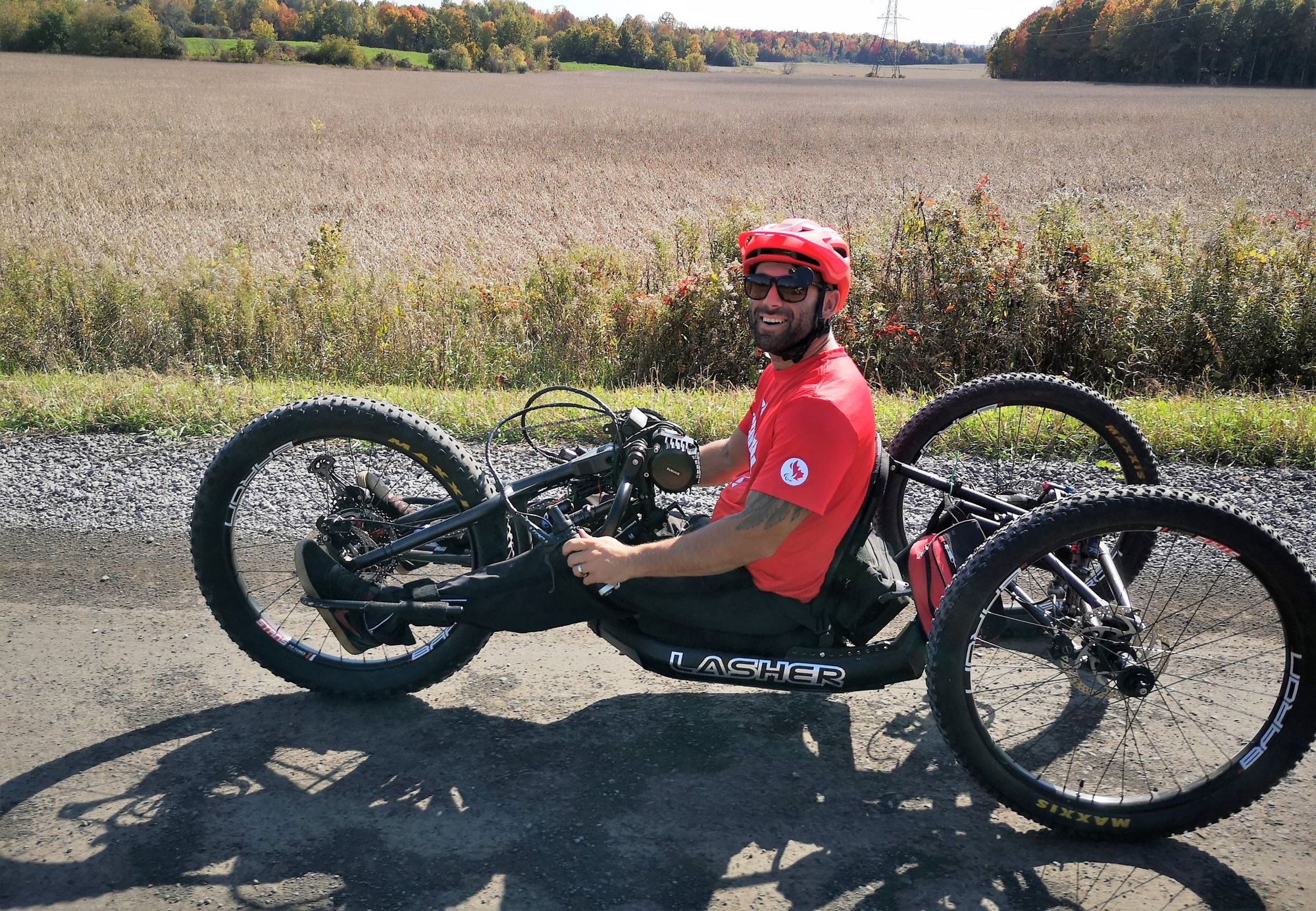I’m waiting at the corner of Cassburn and Sandy Hill roads on a beautiful Friday afternoon, ready for a bike ride with Paralympian handcyclist Joey Desjardins – who is uncharacteristically late. He pulls up on his three-wheeled handcycle about five minutes later with a pretty good excuse for his tardiness.
“Sorry, but I got a call that Stella had chipped a tooth at school as I was on my way here and I had to head back home,” smiles the father of two young girls. “Then I had to boot it to try to get back here in time.”
Balancing family life and training is a difficult task for many athletes, but making time for his wife Vanessa and two young daughters – five-year-old Stella and Zayla, 3 – has always been a priority for the dedicated family man. While it is always a juggling act, Desjardins says he has been able to focus more on his training as the girls get older.
“Having my kids early on, I’m not trying to cycle through newborns,” he explains.
His two daughters are also becoming more aware of their father’s success as a world-class cyclist.
“Stella is at the age where she gets it, but Zayla still calls it the ‘Papa’ lympics,” Desjardins laughs.
Tokyo Paralympics was a bonus
A long shot to make the Cycling Canada team for the 2020 Tokyo Paralympic Games, Desjardins got a second chance when the games themselves were postponed until 2021 due to the COVID-19 pandemic. His progression as an athlete had been impressive since he first began riding for the Canadian team in 2016 and that extra year is what sealed his spot on the Paralympic team, after officials opted to send three riders to compete in the Men’s H3 Handcycling competition.
“Tokyo was a bonus for me, because I always aimed for 2024,” Desjardins says. “And that’s the way I’ve been pushed as well, coming up into the program as a next-gen athlete.”
“I was always told ‘you’re not going to be ready for Tokyo, we’re gearing you more for Paris.”
Desjardins came in 11th in the H3 Time Trials and eighth in the Road Race in Tokyo, finishing as the top Canadian in both competitions – beating out fellow rookie Alex Hyndeman and veteran Charles Moreau, who won bronze in both events at the 2016 Paralympic Games in Rio de Janeiro. Desjardins said the course in Tokyo – which featured a lot of hills and elevation changes – was a good set-up for him, as he is strong in the climbs.
“It actually was a pretty good feeling,” says the Hawkesbury athlete, as he reflected on finishing ahead of his teammates. “Charles is well-rounded and to come out on top in both events was amazing.”
Upon their return to Canada, Desjardins and his teammates headed to St-Georges-de-Beauce, Quebec, for the Canadian National Championships.
“Charles came back with a vengeance,” said Desjardins of his veteran teammate, who finished 37 seconds ahead of Desjardins in the Time Trial and a minute ahead in the Road Race at the National Championships in mid September. “There’s no shame in that – any time you can stay within a minute of Charles, you’re going pretty fast.”
Increased recognition since Paralympics
But back to our ride through the countryside. Joey is on a special mountain-bike version of a handcycle three-wheeler. It’s a unit that he received from Cycling Canada in early 2020 and it has allowed him to ride year-round – something that was impossible on his race trike. It has a small electric motor to assist with pedaling and with it set at low levels, allows Desjardins to go places he could never go before.
“I use it for cross-training,” Desjardins says, as I ride my own two-wheeled e-bike beside him along a gravel-covered rural road west of Cassburn. “I could never take my race bike on a road like this.”
As I follow Desjardins’ three-wheeler along the back roads, we meet several groups of cyclists, who immediately recognize the local Paralympian and lift their hands to wave as he passes by. It’s something that has been happening a lot since he returned from Tokyo.
“I’ve been to a dozen World Cups and three World Championships in the past four or five years and I have never had this much support,” says Desjardins, who received a huge sendoff from his neighbours, family and friends just before he left for the games. “Even now, people see me and go ‘hey, you’re Joey’ and I’m (surprised) – I’m just me.”
“I’m just happy to be able to do this, and having so many people behind me is incredible.”
He credits the increased attention to the fact the Paralympics were televised, and even though Desjardins himself was only shown on screen a handful of times during the cycling competitions, viewers were able to see the dedication and heart of the Paralympian cyclists.
“I think being able to see the whole competition allowed people to see (what it is like) in real life,” he reflects. “I see it all the time – every race you see people at their utmost limit.”
“They’re ready to bust just to make the quickest time.”
Desjardins says he enjoyed his Paralympic experience immensely, despite the fact there were no spectators allowed and COVID-19 regulations made it a very different experience from a regular Games.
“Charles went in having gone to Rio and he says they were nothing alike because of the COVID restrictions and the fans not being allowed to be there,” Desjardins recalls. “I didn’t know any different, so for me it was just a really cool experience.”
Learned from Tokyo experience
Having achieved his dream, Desjardins is now focusing on regular World Cup events and national competitions. While Paris is still a long way away, he says the experience he gained from his unexpected trip to Tokyo will be of great benefit in the 2024 Paralympic Games.
Knowing the Olympic course is key, Desjardins believes, noting that 52-year-old Austrian handcyclist Walter Ablinger, who won the Men’s H3 Road Race in Tokyo, completely changed his body for the hilly course.
“Ablinger showed up 15 pounds lighter than at a World Cup. He went in two years ahead of time and decided I’m going to be this strong and this weight for this hilly course,” says Desjardins, who actually competed in the games five pounds heavier than his normal competition weight of 150, because he felt stronger at 155.
“It’s a fine balance we need to play,” he explains, expanding on what he learned from Ablinger’s strategy. “The key is to not try to cut weight a month before, but do it a year before.”
“The top guys have been in the sport for so long that they know (exactly what they have to do). They’ve been where I am now and they’re already looking ahead.”
Life is a crazy roller coaster sometimes
My ride with Joey is coming to an end and as with every time I’ve ever spoken with him, it has been a very inspiring day. Ever positive and always smiling, Desjardins beams as he speaks about his wife and family, his cycling pursuits, and his life in general. Asked if he ever dreamed that his dirt bike accident in 2009 would lead him to where he is today, Desjardins pauses a moment before answering.
“Life is good, but it’s a crazy roller coaster sometimes,” he smiles. “I don’t know what it is that drives certain people to move on and keep pushing forward.”
“It’s a combination of everything, the support you have and the passion for something you find.”

Review Editor Reid Masson joined Paralympian handcyclist Joey Desjardins for a spin around the back roads of Champlain Township. Photo Reid Masson

Joey Desjardins visits with the crowd gathered at the corner of Bangs Road and Greenlane Road at a special sendoff event prior to leaving for the Tokyo Paralympic Games. His wife Vanessa with daughters Stella and Zayla are in the background. Photo: James Morgan

Joey Desjardins competes at the Tokyo Paralympic Games, in this photo from Cycling Canada’s Facebook page.

Family, friends, and other supporters gathered at the Green Beaver pop-up park in downtown Hawkesbury on August 30 to watch paracyclist Joey Desjardins compete at the Paralympic Games in Tokyo. Desjardins says he has been amazed by the amount of support he has received from the community both leading up to and since the games. Photo: James Morgan


